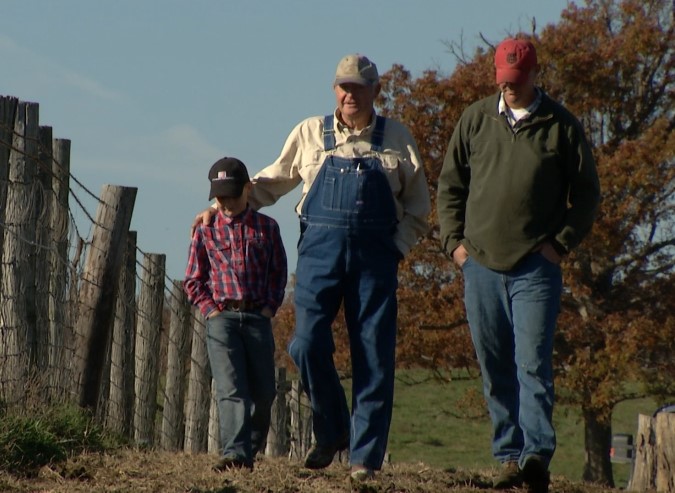
Agricultural News
Planning and Communication are Tools to Help You Pass the Family Farm to the Next Generation
Mon, 19 Jan 2015 07:11:37 CST
 Lack of communication is at the top of a list of several challenges facing families as they look into the future and work toward the passing of the family farm or ranch to the next generation. Oklahoma State University Department of Agricultural Economics Professor Dr. Shannon Ferrell says research at OSU is showing that fewer than 30 percent of farms and ranches are surviving intact in the first generation of transfer and even some estimates show that number is closer to 10 -20 percent. If you look at multiple generations, the numbers shrink even more to 12 percent and three percent.
Lack of communication is at the top of a list of several challenges facing families as they look into the future and work toward the passing of the family farm or ranch to the next generation. Oklahoma State University Department of Agricultural Economics Professor Dr. Shannon Ferrell says research at OSU is showing that fewer than 30 percent of farms and ranches are surviving intact in the first generation of transfer and even some estimates show that number is closer to 10 -20 percent. If you look at multiple generations, the numbers shrink even more to 12 percent and three percent.
Radio Oklahoma Network Farm Director Ron Hays talked with Dr. Ferrell about transition planning as he prepared to make a presentation earlier this month at Agrifest in Enid. Click or tap on the LISTEN BAR below to listen to the full interview.
In evaluating the farms and ranches that did not pass successfully from one generation to the next, Ferrell says that several common threads were that there wasn't enough of an estate plan in place, the farm may have been undercapitalized to support multiple family members and there wasn't any communication between the generations on how the transition will take place. He adds that in many cases individuals were thrust into roles they were not prepared for as the estate plan was executed. To counter these obstacles to success, Ferrell believes that carefully planning well before the transfer happens provides the family a less stressful gameplan of generational transfer.
Estate taxes are often blamed when a family farm has to be liquidated, but the tax landscape has improved in recent years. While we don't know the tax exemption levels for 2015, Ferrell said in 2014 Americans could pass $5.34 million of property, tax free. That was much better than a couple years ago when levels were at a million dollars or less. So for most people they will not have to do a lot of maneuvering to avoid the tax liabilities. Ferrell said that allows greater focus to be placed on how you would like to see the operation work in the hands of the next generation.
Dr. Ferrell says that brings up a very touchy subject. Ag producers are good a lot of things, but they often struggle in these very personal conversations. Ferrell said succession planning needs to open up the dialogue between everyone involved in having a deep meaningful conservation about the future of the family farm. This includes all stakeholders which includes the parents, kids and even hired hands by getting everyone to the table to talk about what they envision for the future of the farm and their desired role on the farm. Once that is established, then you can start developing a business plan on how you are going to get those people involved. Ferrell said a transition plan is somewhat a business plan of how we are going to get people involved and how that is going to change the roles of the future in allowing that next generation grow into their positions, so it is not thrust onto someone when someone passes away.
Ferrell said often times people believe this will be an expensive process, but producers can do a lot of work in advance by taking an inventory of assets, inventory of human resources, like who will be involved in the farm and their skills. He said that is a lot of the leg-work that you would often hire a professional to do, like an accountant or attorney. By doing that work ahead of time and having a good idea about the future of the farm before you engage with professionals, he said you can save yourself a lot of money. Having an estate plan could potentially save your farm thousands of dollars in the long term.
If a farm is broken up or sold off the effects extends beyond the family. Ferrell said that will have a huge impact on your local community with the loss of the asset value.
"You have probably worked generations to build that asset base together," Ferrell said. "The whole really is more than the sum of the parts. When you break that into small pieces, lots of those pieces probably being owned by absentee landowners, who are going to take the income that farm generates and probably spend it elsewhere. That drains a lot of resources from the local economy."
The first step in succession planning is knowing where you are at and where you want to go. Ferrell said it begins with a good inventory, balance sheet and farm records in knowing what your farm income is and your return on investment. He said that may not sound like an important for transition planning, but it is because as you figure out what the operation will do in the future, then you have to know what it is capable of doing now.
WebReadyTM Powered by WireReady® NSI
Top Agricultural News
More Headlines...




















